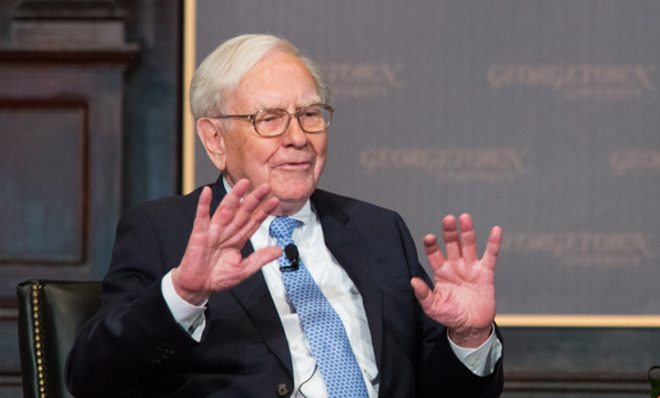Don't call Warren Buffett a tax hypocrite
He's just doing what any good capitalist would do

A free daily email with the biggest news stories of the day – and the best features from TheWeek.com
You are now subscribed
Your newsletter sign-up was successful
Warren Buffett — the Oracle of Omaha and CEO of Berkshire Hathaway — is best known as an entrepreneur and value investor, whose philosophy of identifying undervalued stocks and buying and holding them for years has made him the second richest person on the planet, and for a while last decade, the very richest.
But Buffett's forays into political arguments — specifically, calling for higher taxes on the wealthy and claiming he believes it's ridiculous that he pays a lower rate on his earnings than his secretary — have made him a controversial figure in some circles. In 2010, Buffett calculated that he paid just 17.4 percent of his income as tax, a significantly lower proportion than any of the 20 other people who work in his office.
Buffett explained the unfair advantage he feels he has as follows:
The Week
Escape your echo chamber. Get the facts behind the news, plus analysis from multiple perspectives.

Sign up for The Week's Free Newsletters
From our morning news briefing to a weekly Good News Newsletter, get the best of The Week delivered directly to your inbox.
From our morning news briefing to a weekly Good News Newsletter, get the best of The Week delivered directly to your inbox.
While the poor and middle class fight for us in Afghanistan, and while most Americans struggle to make ends meet, we mega-rich continue to get our extraordinary tax breaks.
These and other blessings are showered upon us by legislators in Washington who feel compelled to protect us, much as if we were spotted owls or some other endangered species. It's nice to have friends in high places. [The New York Times]
Buffett proposed the Buffett rule, a proposal supported by President Obama, which would have those making over a million dollars a year pay a minimum of 30 percent tax on their income. In 2012, a bill on the Buffett rule received 51 affirmative votes in the Senate, but was stopped by a Republican filibuster.
For those views he's been attracting a lot of bad press on the right lately.
One charge is that he's a hypocrite, the ultimate limousine liberal who wants "one rule for me and one for thee."
Buffett admits he will go to any means necessary to pay the lowest level of corporate taxes possible under the law, including building things like wind turbines he wouldn't want to build otherwise, telling an audience in Nebraska recently: "I will do anything that is basically covered by the law to reduce Berkshire's tax rate. For example, on wind energy, we get a tax credit if we build a lot of wind farms. That's the only reason to build them."
A free daily email with the biggest news stories of the day – and the best features from TheWeek.com
So, is it hypocritical to call for higher taxes on the rich while simultaneously trying to pay the lowest tax rate possible?
Now, I admit, I agree with Buffett that millionaires paying lower tax rates on their income than their lower-paid employees is absurd. And yes, he's right that it reduces economic opportunity and worsens economic inequality. But I would also add that at this point, with the relatively weak economic recovery, it might be wiser to balance this tax inequality by lowering taxes for the middle class and poor, rather than raising them for the wealthiest Americans.
But it's just not true that trying to pay the lowest rate possible makes him a hypocrite. If Buffett doesn't position his firm to pay the lowest tax rate possible under the law, that's uncompetitive and will hurt his firm in the market next to its competitors. Buffett is doing what any good capitalist would do — trying to make the most profit possible under the current legal framework. If he didn't economize like this, he wouldn't be a famous billionaire in the first place.
This was effectively Mitt Romney's defense in 2012, when he famously came under fire for paying a tax rate of under 15 percent. And you know what? Romney was right, too (if not on overall tax policy).
Of course, Buffett's critics will point out that Romney wanted to lower taxes, not raise them. But, in my mind, it's a moot point. The fact that Buffett wants to change the legal framework so that all of the wealthiest Americans — including him — have to pay more in taxes evens the playing field. If he wants to pony up more, demanding that his competitors do the same is really the only fair and balanced way to do it.
John Aziz is the economics and business correspondent at TheWeek.com. He is also an associate editor at Pieria.co.uk. Previously his work has appeared on Business Insider, Zero Hedge, and Noahpinion.
-
 How to Get to Heaven from Belfast: a ‘highly entertaining ride’
How to Get to Heaven from Belfast: a ‘highly entertaining ride’The Week Recommends Mystery-comedy from the creator of Derry Girls should be ‘your new binge-watch’
-
 The 8 best TV shows of the 1960s
The 8 best TV shows of the 1960sThe standout shows of this decade take viewers from outer space to the Wild West
-
 Microdramas are booming
Microdramas are boomingUnder the radar Scroll to watch a whole movie